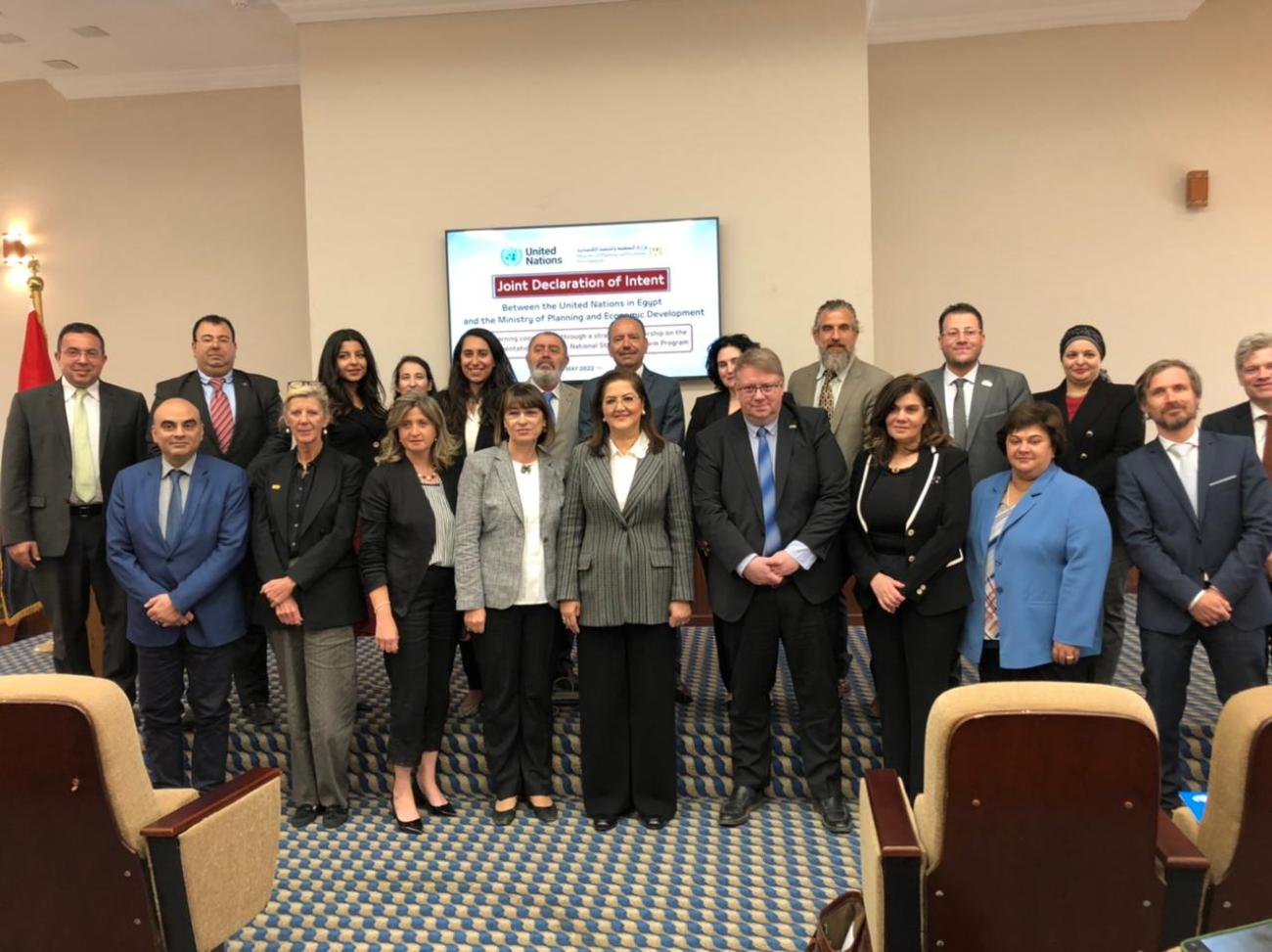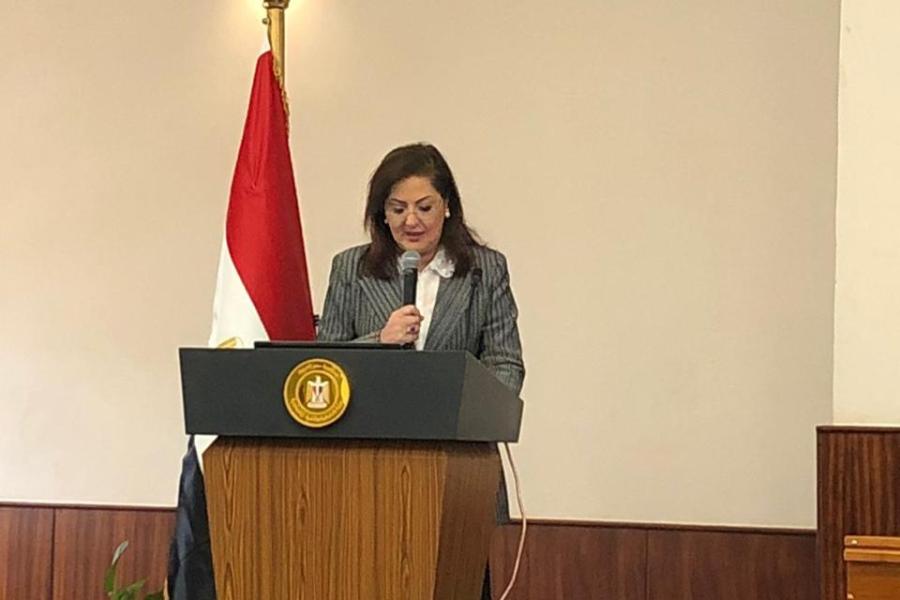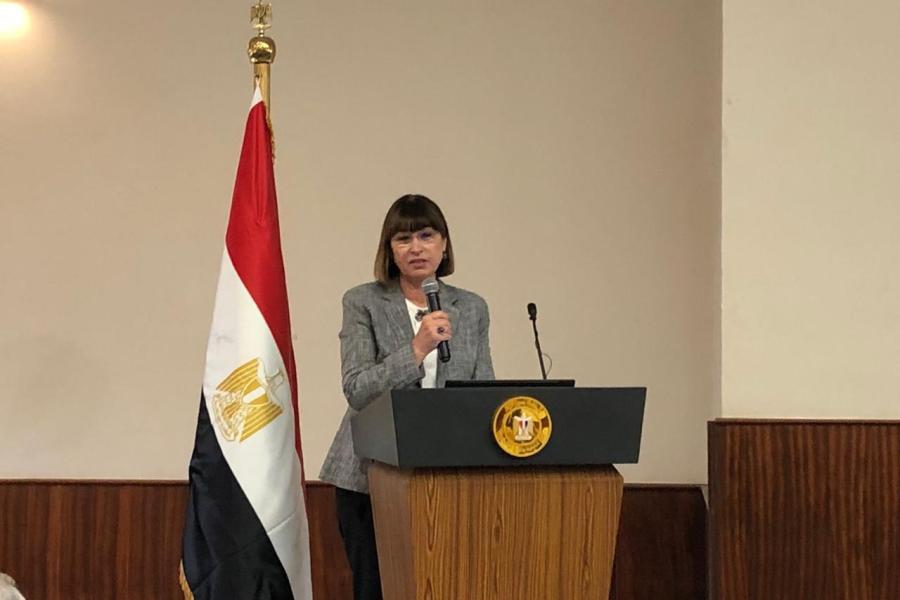Government of Egypt, UN sign a Declaration of Intent to strengthen implementation of Egypt’s National Structural Reform Programme

The partnership aims to accelerate progress towards achieving the SDGs for the benefit of the country and its people by maximizing the benefits of the reform.
Cairo - The Government of Egypt and the United Nations signed a Declaration of Intent to support implementation of Egypt’s National Structural Reform Programme (NSRP) 2021-24. The new strategic partnership was signed by Dr. Hala El Saeed, the Minister of Planning and Economic Development, and Ms. Elena Panova, the United Nations Resident Coordinator in Egypt, during a ceremony held at the Ministry.
Through the newly signed declaration - guided by the UN Partnership Development Framework (2018- 2022) – the Government of Egypt and the United Nations in Egypt commit to working together to accelerate progress in achieving the sustainable development goals (SDGs) by maximizing the benefits of Egypt’s important and ambitious economic reform programme launched in April 2021. This comprehensive reform package aims to diversity the productive structure of the Egyptian economy especially in three leading sectors: manufacturing, agriculture, and information and communications technology (ICT).
Dr. Hala Al-Saeed, Minister of Planning and Economic Development, said that the declaration intends to enhance participation in the implementation of the 2030 Agenda for Sustainable Development through a strategic partnership in implementing the National Structural Reform Agenda for Egypt 2021-2024, which was launched last April.

Al-Saeed added that the global economy has just begun to recover from Covid-19 pandemic, but economic activities around the world has been negatively affected by the global geopolitical repercussions, noting the high rate of inflation due to the rise in food prices, which will have wide effects on plans to achieve sustainable recovery.
Al-Saeed affirmed that, recognizing the crucial importance role of partnerships with international organizations, the private sector, civil society, as well as think tanks and academia to promote the achievement of the sustainable development agenda, the signing of the agreement contributes to the establishment of an important partnership between the United Nations and the Egyptian government, which represents a milestone in continuous and successful cooperation.
Al-Saeed pointed to the Egyptian government's launch of the national structural reform program for a period of three years, explaining that it aims to diversify the productive sectors of the Egyptian economy by focusing on three leading sectors, including manufacturing, agriculture, communications and information technology representing the main pillars of the structural reform program.
Al-Saeed added that the program also includes a comprehensive basic pillar related to raising the efficiency of labor market flexibility, developing the technical education and vocational training system in partnership mainly with the private sector, and implementing the labor management information system for the first time.
Al-Saeed continued that during the implementation of the National Structural Reform Program, there will be specific areas of cooperation with the United Nations Resident Coordinator in Egypt, including forecasting the potential effects of reforms on the selected sustainable development goals, in addition to reviewing specific policy measures and quantitative goals specified in the National Structural Reform Program focusing on inclusiveness and sustainability, as well as identifying UN technical assistance and capacity development support to accelerate the implementation of the National Structural Reform Program, as well as facilitating effective multi-stakeholder partnerships and awareness raising. Both parties will work together to collaborate on raising awareness of the benefits and implications of reforms among selected stakeholders through joint campaigns for advocacy and communications.
Al-Saeed thanked Mrs. Elena Panova and affirmed her confidence that the committed efforts will enable developing stronger multi-stakeholder cooperation between the Egyptian government and the United Nations.

From her side, Ms. Panova commented that the UN family in Egypt is proud of its partnership with the Government of Egypt to address the critical structural reforms that will support sustainable development and help ensure that no one is left behind. The engagement with the Government will work to strengthen the reform program through evidence based monitoring and forecasting of policy impacts to help Egypt further recover from COVID-19, cushion the effects of the ongoing geopolitical crisis, and accelerate progress towards the SDGs.
Dr. Nada Masoud, Economic Adviser to the Minister of Planning and Economic Development, presented the main elements of Egypt’s economic reform program focusing on the second phase and the structural reform program. She emphasized on the actual economies and it consistency with Egypt’s Vision 2030 and the 17 UN goals, and takes into account what is related to the Green economy, environmental protection and food security, explaining that the program addresses 6 pillars, 31 policies and 117 measurement indicators. Masoud also touched on the role of partners in achieving the program and its pillars.
The agreement entails joint delivery of interventions in six areas to help boost the economic reforms and ensure positive impact across the SDGs and for the lives and livelihoods of vulnerable groups. This includes forecasting the potential implications of reforms on different SDGs such as poverty reduction and job creation. The United Nations and the Minister of Planning and Economic Development will also jointly review specific policy measures to ensure they take into account the needs of all regions and social groups, with a special focus on youth, women and girls and the most vulnerable segments of the population. In addition, the partnership will create a high-frequency monitoring system to measure the impact of reforms along with new multi-stakeholder partnerships to support implementation and raise awareness of the reforms. Finally, the United Nations and the Minister of Planning and Economic Development will together identify areas where UN technical assistance and capacity development can help fast-track implementation.

















